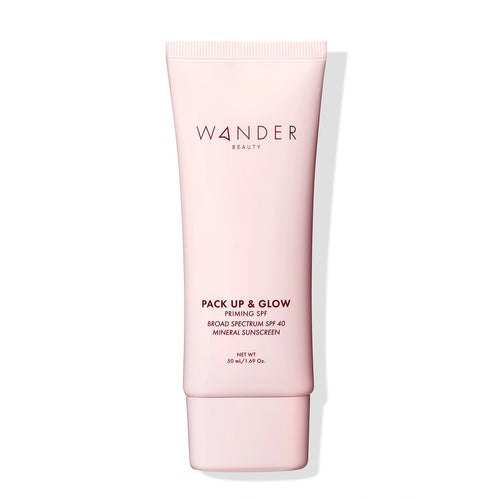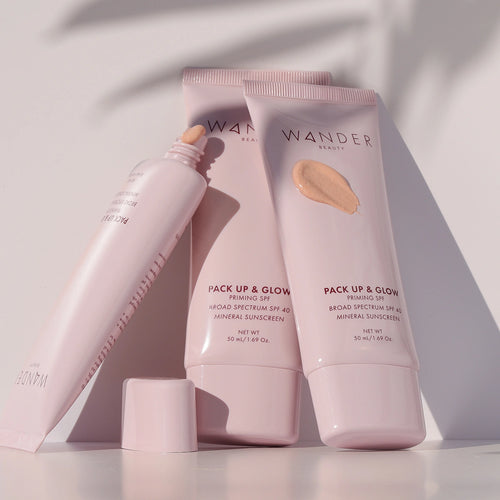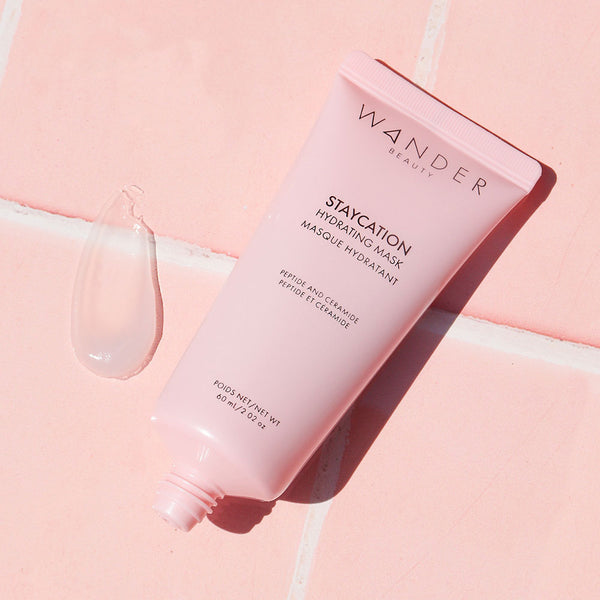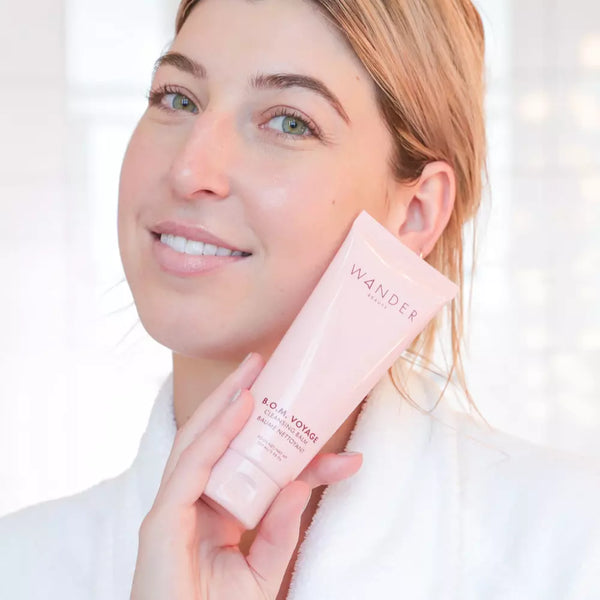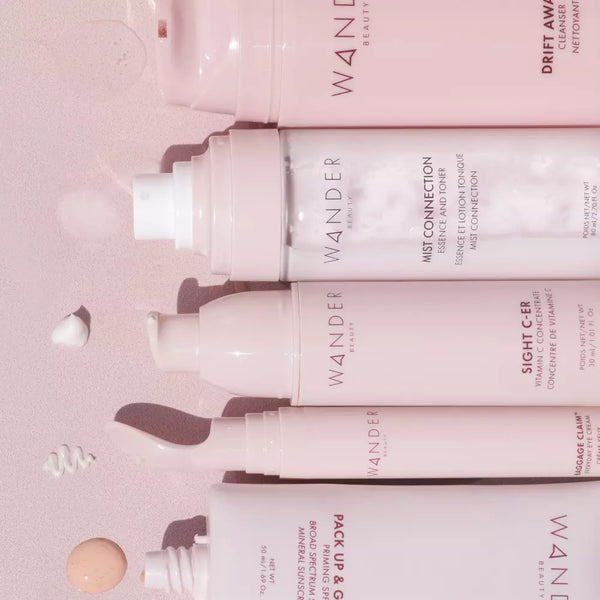How to Care for Acne Prone Skin
By Wander Beauty | Oct 24, 2022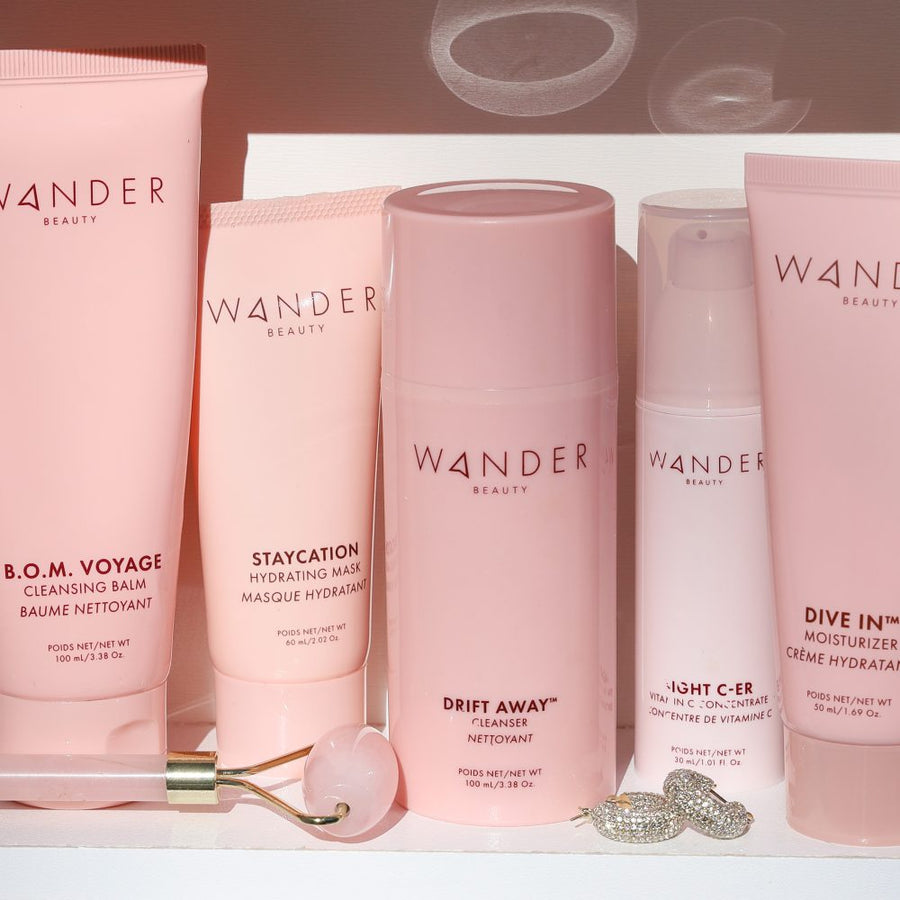
Acne is the most common skin condition in the United States, affecting up to 50 million Americans each year. And while it may cause irritation, pain, and discomfort, it's nothing to be ashamed of. The term acne applies to everything from whiteheads and blackheads to deeper papules and painful cysts. But instead of trying to fight it, you can take a more mindful approach and choose instead to care for your skin by adopting a gentle skincare routine, choosing skin-loving products, and being conscious of your lifestyle habits.
So, what is the best acne treatment, how do you care for your acne prone skin, and what are the dos and don'ts? Let's find out.
What causes acne?
Acne is most commonly found on the face, chest, and back as these are the areas that produce the most sebum. Hormones, bacteria, and genetics have long been associated with acne problems. Before learning how to get rid of acne, you need to understand how it develops.
The key factors that contribute to the formation of acne include:
Seborrhea: This is the overproduction of sebum. Sebaceous glands secrete an oily substance known as sebum to lubricate the skin and hair. Hormones, climate, certain medications, and genetics can trigger an overproduction of sebum.
Hyperkeratosis: This is a thickening of the outer layer of skin. Irregular shedding of dead skin cells clogs the sebaceous gland’s duct and disturbs the release of sebum. When the skin produces an excess amount of sebum and dead skin cells remain attached to the skin, the two can build up in the hair follicle and form together as a soft plug. This plug may cause the follicle wall to bulge and produce a whitehead or, if the plug is close to the surface, a blackhead.
Microbial colonization: Bacteria that normally live harmlessly on the skin can build up and can then colonize the plugged follicles, causing papules, pustules, nodules, or cysts.
Inflammation: The consequence is red and inflamed skin. Lipids, fatty acids, corneocytes, bacteria, and cell fragments are released, causing extended and deep inflammation in the tissue.
Factors that may trigger or exacerbate acne include:
- An unhealthy diet or the consumption of foods you have an allergy or sensitivity to
- Stress
- Certain medication
- Hormonal changes or imbalances
- Regular tobacco use
- Comedogenic skin care products
Skincare tips for acne prone skin
Keep to a regular skincare routine: Remove excess dirt, oil, and bacteria by washing your face twice a day and after sweating. Use a gentle cleanser and follow with a hydrating moisturizer, such as Dive In™Moisturizer, to keep your skin clean, balanced, and hydrated. As tempting as it is to try the latest acne-fighting products, it's best to stick to a simple skincare routine and give the products you use time to work. Changing products too often may lead to unnecessary irritation.<product>1</product>
Use your fingers to apply product: Use clean fingertips to apply your cleanser, moisturizer, serums, and sunscreen. Using a washcloth, mesh sponge, or anything else may irritate the skin.
Avoid harsh scrubs and exfoliants: You may want to scrub your breakouts away, but scrubbing your skin can actually make acne worse. Instead, choose gentle exfoliants and avoid excessive friction, which can cause redness and inflammation.
Protect against sun exposure: Wearing sunscreen is important for everyone, but especially for those with sensitive, irritated, or acne prone skin. Many acne treatment products and medications contain active ingredients like retinol, benzoyl peroxide, and salicylic acid, which make your skin more sensitive to the sun. Choosing a lightweight, mineral-based sunscreen such as Pack Up & Glow Priming Mineral SPF 40, will protect your skin from harmful rays and help you avoid unnecessary redness, pain, and inflammation.<product>2</product>
Be mindful of what you consume: One hamburger is not going to mysteriously punish you with a hamburger-sized spot, but a poor diet definitely isn't going to help in your efforts to achieve clear, radiant skin. Staying hydrated with plenty of water and focussing your diet on nutrient-rich foods, including lean proteins, fruits, and vegetables, are sure to keep you looking and feeling your best. People with skin issues of any kind need to be aware of any food intolerances or sensitivities they may have, such as gluten or dairy, which could cause a flair when consumed.
What to avoid
Sharing makeup or makeup applicators: While acne isn't contagious, acne-causing bacteria, oils, and dead skin cells from other people's skin could land up in your makeup – and so your skin – if you share products. This could clog your pores, leading to further breakouts, so it's best not to share any makeup and to clean your makeup tools regularly.
Going to bed with makeup on: Removing your makeup before going to sleep is non-negotiable. Your makeup can trap dirt, bacteria, oils, and dead skin cells throughout the day. If you fail to remove it before going to sleep, you are saturating your skin with these nasty pollutants. Not only will this lead to clogged pores, but it can also result in collagen degradation and lead to signs of premature aging over time.
Popping or picking at breakouts: Popping the unwanted visitor you woke up to may be tempting, but it can actually push the bacteria deeper into the skin, which may lead to increased swelling and redness. Squeezing also can lead to scabs and might leave you with permanent scars. Instead, follow your acne-approved skincare routine and see a dermatologist if necessary.
Harsh ingredients: Synthetic fragrances are a major source of skin allergies. Sodium laureth sulfate is known to cause skin inflammation and irritation, and isopropyl palmitate is a highly comedogenic emollient ingredient that may further clog pores. Avoiding these and other harsh ingredients, which are often present in “acne-fighting” products, will ensure that your skin doesn't get any more red, inflamed, or irritated than it may already be.
Touching your face: Touching your skin throughout the day can introduce more bacteria to your skin, and may increase oil production, both of which can lead to flare-ups. Be sure to wash your hands regularly, and make a habit of avoiding touching your face unnecessarily.
Best acne treatment products
When choosing makeup and skincare products that won't exacerbate acne or irritate already-sensitive, inflamed skin, you’ll want to opt for clean, gentle products that are packed with skin-loving ingredients and free from synthetic fragrances, parabens, and comedogenic ingredients.
Below are some of our favorite skincare products, suitable for all skin types, that each has a unique effect in helping you combat acne and soothe, repair, and visibly improve your skin.
Staycation Hydrating Face Mask
Staycation Hydrating Face Mask is a multitasking formula that acts as a nourishing daily moisturizer, a soothing rinse-off mask, and an intensely hydrating overnight mask. Formulated with Ceramide NP, it helps protect the skin's natural barrier and keep irritants and pollutants out. It also improves skin texture, which is often damaged during breakouts, and prevents moisture loss to help keep your skin balanced, supple, and healthy. This is undoubtedly one of the best hydrating face masks for acne prone skin.<product>3</product>
Sight C-er Vitamin C Concentrate
Because of its anti-inflammatory properties, vitamin C is a highly valuable addition to your skincare arsenal. Sight C-er Vitamin C Concentrate is a fast-absorbing, lightweight formula that brightens and soothes skin, balances oil production, evens skin texture, and helps reduce the redness and swelling that comes with acne. Protect your skin from environmental stressors with this fantastic vitamin C serum.<product>4</product>
Do Not Disturb Overnight Repair Concentrate
Retinoids are one of the most effective ingredients in the treatment of acne and are widely recommended by skincare experts due to their ability to unblock pores and improve skin tone and texture. Do Not Disturb Overnight Repair Concentrate repairs, protects, and renews your skin overnight. It is formulated with 1% retinoid to help diminish the appearance of uneven skin tone and texture, as well as dragon's blood and azulene to soothe and shield skin from environmental stressors during the day. Using Do Not Disturb regularly will result in smoother, healthier, and more youthful-looking skin.<product>5</product>
Discover more secrets to a natural glow with Wander Beauty
Your skincare products and routine can help repair and protect your skin throughout the day, but you’ll need to make sure your makeup products are on the same team. Luckily, we’ve enriched our makeup with skin-nourishing ingredients so you don't need to choose between looking and feeling good!
How to Care for Acne Prone Skin
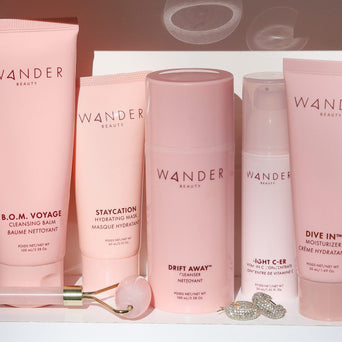
Acne is the most common skin condition in the United States, affecting up to 50 million Americans each year. And while it may cause irritation, pain, and discomfort, it's nothing to be ashamed of. The term acne applies to everything from whiteheads and blackheads to deeper papules and painful cysts. But instead of trying to fight it, you can take a more mindful approach and choose instead to care for your skin by adopting a gentle skincare routine, choosing skin-loving products, and being conscious of your lifestyle habits.
So, what is the best acne treatment, how do you care for your acne prone skin, and what are the dos and don'ts? Let's find out.
What causes acne?
Acne is most commonly found on the face, chest, and back as these are the areas that produce the most sebum. Hormones, bacteria, and genetics have long been associated with acne problems. Before learning how to get rid of acne, you need to understand how it develops.
The key factors that contribute to the formation of acne include:
Seborrhea: This is the overproduction of sebum. Sebaceous glands secrete an oily substance known as sebum to lubricate the skin and hair. Hormones, climate, certain medications, and genetics can trigger an overproduction of sebum.
Hyperkeratosis: This is a thickening of the outer layer of skin. Irregular shedding of dead skin cells clogs the sebaceous gland’s duct and disturbs the release of sebum. When the skin produces an excess amount of sebum and dead skin cells remain attached to the skin, the two can build up in the hair follicle and form together as a soft plug. This plug may cause the follicle wall to bulge and produce a whitehead or, if the plug is close to the surface, a blackhead.
Microbial colonization: Bacteria that normally live harmlessly on the skin can build up and can then colonize the plugged follicles, causing papules, pustules, nodules, or cysts.
Inflammation: The consequence is red and inflamed skin. Lipids, fatty acids, corneocytes, bacteria, and cell fragments are released, causing extended and deep inflammation in the tissue.
Factors that may trigger or exacerbate acne include:
- An unhealthy diet or the consumption of foods you have an allergy or sensitivity to
- Stress
- Certain medication
- Hormonal changes or imbalances
- Regular tobacco use
- Comedogenic skin care products
Skincare tips for acne prone skin
Keep to a regular skincare routine: Remove excess dirt, oil, and bacteria by washing your face twice a day and after sweating. Use a gentle cleanser and follow with a hydrating moisturizer, such as Dive In™Moisturizer, to keep your skin clean, balanced, and hydrated. As tempting as it is to try the latest acne-fighting products, it's best to stick to a simple skincare routine and give the products you use time to work. Changing products too often may lead to unnecessary irritation.<product>1</product>
Use your fingers to apply product: Use clean fingertips to apply your cleanser, moisturizer, serums, and sunscreen. Using a washcloth, mesh sponge, or anything else may irritate the skin.
Avoid harsh scrubs and exfoliants: You may want to scrub your breakouts away, but scrubbing your skin can actually make acne worse. Instead, choose gentle exfoliants and avoid excessive friction, which can cause redness and inflammation.
Protect against sun exposure: Wearing sunscreen is important for everyone, but especially for those with sensitive, irritated, or acne prone skin. Many acne treatment products and medications contain active ingredients like retinol, benzoyl peroxide, and salicylic acid, which make your skin more sensitive to the sun. Choosing a lightweight, mineral-based sunscreen such as Pack Up & Glow Priming Mineral SPF 40, will protect your skin from harmful rays and help you avoid unnecessary redness, pain, and inflammation.<product>2</product>
Be mindful of what you consume: One hamburger is not going to mysteriously punish you with a hamburger-sized spot, but a poor diet definitely isn't going to help in your efforts to achieve clear, radiant skin. Staying hydrated with plenty of water and focussing your diet on nutrient-rich foods, including lean proteins, fruits, and vegetables, are sure to keep you looking and feeling your best. People with skin issues of any kind need to be aware of any food intolerances or sensitivities they may have, such as gluten or dairy, which could cause a flair when consumed.
What to avoid
Sharing makeup or makeup applicators: While acne isn't contagious, acne-causing bacteria, oils, and dead skin cells from other people's skin could land up in your makeup – and so your skin – if you share products. This could clog your pores, leading to further breakouts, so it's best not to share any makeup and to clean your makeup tools regularly.
Going to bed with makeup on: Removing your makeup before going to sleep is non-negotiable. Your makeup can trap dirt, bacteria, oils, and dead skin cells throughout the day. If you fail to remove it before going to sleep, you are saturating your skin with these nasty pollutants. Not only will this lead to clogged pores, but it can also result in collagen degradation and lead to signs of premature aging over time.
Popping or picking at breakouts: Popping the unwanted visitor you woke up to may be tempting, but it can actually push the bacteria deeper into the skin, which may lead to increased swelling and redness. Squeezing also can lead to scabs and might leave you with permanent scars. Instead, follow your acne-approved skincare routine and see a dermatologist if necessary.
Harsh ingredients: Synthetic fragrances are a major source of skin allergies. Sodium laureth sulfate is known to cause skin inflammation and irritation, and isopropyl palmitate is a highly comedogenic emollient ingredient that may further clog pores. Avoiding these and other harsh ingredients, which are often present in “acne-fighting” products, will ensure that your skin doesn't get any more red, inflamed, or irritated than it may already be.
Touching your face: Touching your skin throughout the day can introduce more bacteria to your skin, and may increase oil production, both of which can lead to flare-ups. Be sure to wash your hands regularly, and make a habit of avoiding touching your face unnecessarily.
Best acne treatment products
When choosing makeup and skincare products that won't exacerbate acne or irritate already-sensitive, inflamed skin, you’ll want to opt for clean, gentle products that are packed with skin-loving ingredients and free from synthetic fragrances, parabens, and comedogenic ingredients.
Below are some of our favorite skincare products, suitable for all skin types, that each has a unique effect in helping you combat acne and soothe, repair, and visibly improve your skin.
Staycation Hydrating Face Mask
Staycation Hydrating Face Mask is a multitasking formula that acts as a nourishing daily moisturizer, a soothing rinse-off mask, and an intensely hydrating overnight mask. Formulated with Ceramide NP, it helps protect the skin's natural barrier and keep irritants and pollutants out. It also improves skin texture, which is often damaged during breakouts, and prevents moisture loss to help keep your skin balanced, supple, and healthy. This is undoubtedly one of the best hydrating face masks for acne prone skin.<product>3</product>
Sight C-er Vitamin C Concentrate
Because of its anti-inflammatory properties, vitamin C is a highly valuable addition to your skincare arsenal. Sight C-er Vitamin C Concentrate is a fast-absorbing, lightweight formula that brightens and soothes skin, balances oil production, evens skin texture, and helps reduce the redness and swelling that comes with acne. Protect your skin from environmental stressors with this fantastic vitamin C serum.<product>4</product>
Do Not Disturb Overnight Repair Concentrate
Retinoids are one of the most effective ingredients in the treatment of acne and are widely recommended by skincare experts due to their ability to unblock pores and improve skin tone and texture. Do Not Disturb Overnight Repair Concentrate repairs, protects, and renews your skin overnight. It is formulated with 1% retinoid to help diminish the appearance of uneven skin tone and texture, as well as dragon's blood and azulene to soothe and shield skin from environmental stressors during the day. Using Do Not Disturb regularly will result in smoother, healthier, and more youthful-looking skin.<product>5</product>
Discover more secrets to a natural glow with Wander Beauty
Your skincare products and routine can help repair and protect your skin throughout the day, but you’ll need to make sure your makeup products are on the same team. Luckily, we’ve enriched our makeup with skin-nourishing ingredients so you don't need to choose between looking and feeling good!



